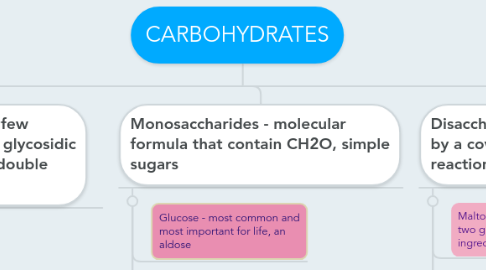CARBOHYDRATES
by Lyssa Lai

1. Polysaccharides - a few hundred to a few thousand monosaccharides joined by glycosidic linkages, combination of simple and double sugars
1.1. Starch - polymer of glucose monomers, stored as sugars for later use (stored energy)
1.1.1. Amylose
1.1.2. Amylopectin
1.2. Glycogen - polymer of glycogen, stored in liver and muscle cells, released when demand of sugar increases, short-term energy
1.3. Cellulose - makes up cell walls in plants
1.4. Chitin - makes up the exoskeletons of arthropods, makes up cells walls of fungi
2. Monosaccharides - molecular formula that contain CH2O, simple sugars
2.1. Glucose - most common and most important for life, an aldose
2.2. Fructose - an isomer (has same chemical structure with different arrangement) of glucose, a ketose
2.3. Galactose - similar to glucose with only two molecules rearranged, an energy source for organisms
3. Disaccharide - two monosaccharides joined by a covalent bond from a dehydration reaction (glycosidic linkage), double sugars
3.1. Maltose - formed from the glycosidic linkage of two glucose molecules, malt sugar (an ingredient in brewing beer)
3.2. Sucrose - formed from the glycosidic linkage of one glucose and one fructose molecule, table sugar
3.3. Lactose - formed from the glycosidic linkage of one glucose and one galactose molecules, the sugar in milk


